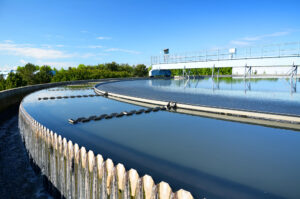Wastewater management is an increasingly urgent challenge for municipalities, factories, and agribusinesses everywhere. Regulators, shareholders, and the general public demand alternatives to old chemical-based methods of effluent treatment no longer believed to be safe. Custom enzyme formulations combined with microbial inoculation empowers wastewater emitters to reduce environmental impact and achieve environmental goals while simultaneously reducing expenses.
How Do Enzymes Work In Wastewater Treatment?
Enzymes are biological catalysts. They influence the speed of reactions without being consumed in the process.
Every enzyme has an active site that reacts with a specific substrate. Enzyme and substrate are often compared to lock and key. The molecular geometries of the binding sites on the enzyme and substrate are such that the combination has to be “just right” for an enzyme to influence a chemical reaction.
Custom enzyme formulas can reduce biological oxygen demand, also known as BOD.
BOD is the amount of oxygen bacteria need from water to break down organic matter under aerobic conditions. Sources of BOD include dead plants and animals, leaf and wood debris, effluents from paper mills, feedlots, and food-processing plants, and sewage. High concentrations of organic matter in wastewater can increase BOD to the point that fish and other wildlife are endangered by anoxic conditions. Enzyme treatment and microbial inoculation of solid waste in holding ponds before it is released to streams and rivers substantially reduces BOD.
Enzyme treatment can also target COD, chemical oxygen demand, the amount of dissolved oxygen used during the breakdown of chemical contaminants in wastewater. And, particularly important for public relations, enzyme treatment can be used to reduce odor emissions at every stage in the process of treating wastewater.
What Is Different About Enzyme Treatment of Wastewater?
Physicochemical treatments of wastewater, such as precipitation, flotation, coagulation, flocculation, and membrane filtration are easy to control. They get fast results. However, these chemical reactions are temperature-sensitive, and demand considerable energy input. After the decontamination process is complete, there is a need for sludge removal.
Enzyme treatment is clean and green. It can remove a targeted wastewater contaminant without creating sludge. It can work under mild reaction conditions, without major modifications to pH and temperature. And unlike chemicals used to treat waste, enzymes can be recovered at the end of the decontamination process, and used again to treat more wastewater without additional expense.
Advantages of Enzyme Treatment
Custom enzyme formulations act as bioremediators of contaminants in effluent. The combined action of enzymes and microbes disintegrates solvents and other noxious chemicals into compounds that reduce COD.
Enzyme treatments begin to degrade organic waste as soon as they are applied. They are customized to work in sync with bacteria. Enzymes influence both aerobic and anaerobic breakdown processes to break down long, complex waste molecules into simpler molecules that the bacteria can use as a food source.
Enzyme treatment does not eliminate the production of sludge, of course. However, the remaining solid waste is easier to process in less time because the volume of sludge will be smaller. The remaining sludge is easier to pump, process, and dewater.
Most wastewater treatment operations are especially sensitive to the release of sulfates, which become smelly sulfides, producing undesirable odors, and sulfuric acid, which corrodes pipes and other infrastructure. Enzyme mixtures can be formulated and paired with specific bacteria to control this problem.
And at every stage of the process, enzyme treatment increases the reliability and predictability of wastewater decontamination, making it easier for plants to meet regulatory scrutiny and keep all of their stakeholders happy with the results.
American Biosystems produces customizable mixtures of proprietary strains of bacteria that produce the amylase, cellulase, lipase, and protease enzymes for complex industrial wastewater treatment. American Biosystems also produces mixtures that address COD, BOD, or both in light industrial wastewater processing. And American Biosystems produces a selection of enzyme-producing bacteria for the treatment of municipal sewage.
American Biosystems offers only the most reliable enzyme products possible. We have developed our expertise by serving customers in 15 countries, enabling us to source the highest-quality products at a value superior to our competitors.
American BIosystems provides the enzymes and the expertise that municipalities, agribusinesses, and industry need for cleaner wastewater. Call us at 888.344.6469 toll free or contact us today through our online form.





